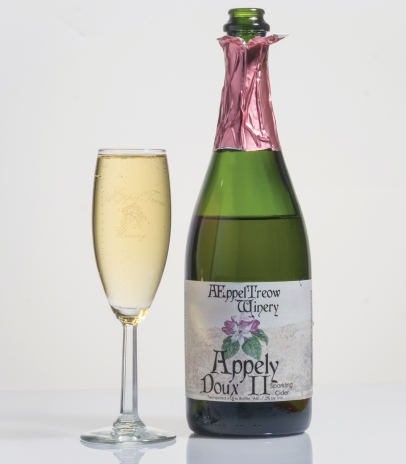Mother Nature's Cider
The most interesting foods we eat have a direct connection to the land, the plant and the farmer that grew them...
ÆppelTreow Winery and Distillery (pronounced Apple True) is the brainchild and passion project cidery of Charles and Milissa McGonegal, partnering with Brightonwoods Orchard in Burlington, Wisconsin. Back in the nonage of his biochemical engineering degree college years, Charles started making mead under his desk. Quickly realizing that mead wasn’t his preferred flavor profile he switched, with the encouragement of a professor, to making cider.
As a biochemist, Charles realized that the technical side of cider making could be mastered quickly. And once mastered, there was really only one substantial factor left in high quality cider production—the raw material itself: apples.
The most interesting foods we eat have a direct connection to the land, the plant and the farmer that grew them. Each and every place on this Earth has a unique biological niche capable of yielding something unique and tasty. The French word for this idea is terroir—and ÆppelTreow is an outstanding example of Wisconsin’s beautiful terroir.
Back in the late 18th century, orchards and cideries that celebrated their terroir weren’t hard to find. But that was then. By the time Charles came around, there were fewer than 40 cideries in the U.S. left, and very few heirloom orchards. The genetic heritage of U.S. apples was vastly shrinking to just those apples that could survive the food supply chain, simplifying them down into three colors (not even varietals)—red, green and gold.
Charles started researching, combing through old books for ‘lost’ apple varieties. He then began calling orchards asking if they had, say, Newtown Pippin apples, but most only carried one variety, and some were unaware other varieties even existed! An orchard finally answered, “Yes, we have many Pippins—as well as 40 other kinds of apples growing on our farm.” It was Brightonwoods Orchard, and Charles, Milissa and the Brightons formed the partnership to bring ÆppelTreow to fruition.
But why is all of this important? Why not just go down to your local liquor store, pop yourself a Crispin and not worry about 200 cultivars of heirloom apples on a small orchard from a small town in Wisconsin? The details are in the
elegant subtlety of these ciders.
Apples are actually not very sugary, at least not as sugary as grapes. So when produced to make cider, there are a couple of interesting chemical changes that happen which most large-scale commercial cideries can’t reproduce.
First, apple cider likes to ferment dry. Meaning the yeast strain most responsible for alcohol fermentation, saccharomyces, has no trouble at all eating its way through all the sugars in a batch of cider. The result could be considered like a dry, light-bodied wine, usually finishing fermentation around 7% ABV.
Second, in fresh cultivar fermentation, the esters of the apples are edible for yeast—they’ll gobble them right on up, too. And unlike in wine, which has terpenes to amp up the smell, or in beer, which could have any number of ingredients to intensify the scent, orchard-driven cider relies solely on its fruit esters. Controlling the yeast eating variable means that expertly made ciders are actually elixirs of crystalline elegance and transcendent subtlety.
ÆppelTreow’s Appley Doux II is an Orchard Run recipe, not a specific formula. In his search for apple varieties, Charles found something rather tragic, that the knowledge of what heirloom varieties like to grow where, has largely been lost in the United States. Partnering with Brightonwoods Orchard, they planted over 40 varieties to explore and research this enormous lost diversity. Every year the Appley Doux II is made by Mother Nature and what she ripens across this orchard.
Looking across the Atlantic, the English and the French have a style of cider making that uses distinctly tannic apples. Tannins are the compounds that give red wine its dryness. In the Appley Doux II, part of the orchard blend is tannic apples. To balance out these tannins, this cider is just a touch sweet, removing the bitter dryness of the tannins and emphasizing a luxurious, almost barrel-aged mouthfeel.
The Doux II opens with a deep and dark note—a rich sense of burnished wood reinforced by a browned butter cinnamon apple pie and a touch of bacon curing in the back of the woodshop. Its aromas are reminiscent of a cozy winter evening, snuggled up inside while reading an old book. While being slightly sweeter, a better way to describe this cider is powerful. There is depth and weight with a strong finish; clearly it is the red wine drinker’s cider.
The cider market is growing at an immense speed, and with good reason—it is the ultimate crossover beverage. There’s a reason breweries and distilleries are getting into the cider game—every beer or bourbon drinker can enjoy a crisp cider and every wine drinker can appreciate its tension and minerality. Cider is less alcoholic than wine (and now most beers), crisp and refreshing and it pairs especially well with fall meals. Make your holiday season sparkle with ÆppelTreow’s Appley Doux II! Cheers.
ÆppelTreow Winery and Distillery
1072 288th Avenue
Burlington, Wisconsin 53105
aeppeltreow.com



